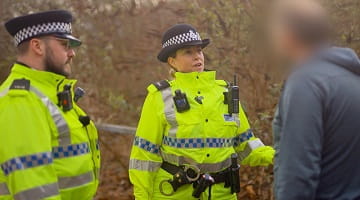2024/25 entry Applications also open for 2025/26
BA (Hons) Policing Studies
Why study Policing Studies at Liverpool John Moores University?
- Taught entirely online, the course will allow you to study flexibly for a level 6 qualification
- Allows existing Foundation degree students to progress to a BA (Hons) Policing Studies in two years
- Innovative and thought-provoking modules both reflect and challenge current policing practices and debates
- Be part of the new Liverpool Centre for Advanced Policing Studies, the UK's first research centre devoted to supporting the needs of 21st century policing
About your course
Liverpool Centre for Advanced Policing is a pioneering research centre for interdisciplinary law enforcement, and is licensed by the College of Policing to deliver degree programmes included in the Police Education Qualification Framework.
Complete a Policing Studies degree in two years from the comfort of your own home.
If you have always wanted to study for a degree but didn’t want to give up your job to study, Liverpool John Moores University is offering a two-year BA (Hons) in Policing Studies degree, which can be studied part-time and totally online as distance learning, delivered via the LJMU Virtual Learning Environment (VLE) ‘Canvas’.
The degree will take you on a critical exploration of policing, encouraging you to reflect on the contemporary challenges within policing and investigation. The course’s innovative and thought-provoking modules both reflect and challenge current policing practices and will act as continuing professional development for serving police officers and support staff.
The course is designed to develop students for careers in policing and law enforcement, security and other allied professions and is ideal for current holders of the Foundation Degree in Policing and acts as a ‘top-up’ in those circumstances.
"The skills and knowledge that I now have is going to be very valuable when getting into a career after my degree, it's a fantastic course and will only get better and better."
Fees and funding
There are many ways to fund study for home and international students
Fees
The fees quoted above cover registration, tuition, supervision, assessment and examinations as well as:
- library membership with access to printed, multimedia and digital resources
- access to programme-appropriate software
- library and student IT support
- free on-campus wifi via eduroam
Additional costs
Although not all of the following are compulsory/relevant, you should keep in mind the costs of:
- accommodation and living expenditure
- books (should you wish to have your own copies)
- printing, photocopying and stationery
- PC/laptop (should you prefer to purchase your own for independent study and online learning activities)
- mobile phone/tablet (to access online services)
- field trips (travel and activity costs)
- placements (travel expenses and living costs)
- student visas (international students only)
- study abroad opportunities (travel costs, accommodation, visas and immunisations)
- academic conferences (travel costs)
- professional-body membership
- graduation (gown hire etc)
Funding
There are many ways to fund study for home and international students. From loans to International Scholarships and subject-specific funding, you'll find all of the information you need on our specialist funding pages.
Employability
On completion of this two-year degree programme, you will be eligible to apply within five years to police constabularies for appointment as police constables.
Achieving this degree is a requirement but does not guarantee appointment to a police force. Recruitment and appointment is subject to the relevant regulations and requirements of police recruitment and selection processes. This includes medical and fitness testing along with background and security checks. Recruitment and selection processes are rigorous and may vary between forces.
Candidates applying to join a police constabulary must also undertake a series of assessments including National Recruitment processes and Force vetting. Guidance on recruitment can be found on the College of Policing website.
Student Futures - Careers, Employability and Enterprise Service
A wide range of opportunities and support is available to you, within and beyond your course, to ensure our students experience a transformation in their career trajectory. Every undergraduate curriculum includes Future Focus during Level 4, an e-learning resource and workshop designed to help you to develop your talents, passion and purpose.
Every student has access to Careers Zone 24/7, LJMU's suite of online Apps, resources and jobs board via the LJMU Student Futures website. There are opportunities for flexible, paid and part-time work through Unitemps, LJMU's in-house recruitment service, and we also offer fully funded Discovery Internships.
One-to-one careers and employability advice is available via our campus-based Careers Zones and we offer a year-round programme of events, including themed careers and employability workshops, employer events and recruitment fairs. Our Start-Up Hub can help you to grow your enterprise skills and to research, plan and start your own business or become a freelancer.
A suite of learning experiences, services and opportunities is available to final year students to help ensure you leave with a great onward plan. You can access LJMU's Careers, Employability and Start-up Services after you graduate and return for one-to-one support for life.
Go abroad
LJMU aims to make international opportunities available to every student. You may be able to study abroad as part of your degree at one of our 100+ partner universities across the world. You could also complete a work placement or apply for one of our prestigious worldwide internship programmes. If you wanted to go abroad for a shorter amount of time, you could attend one of our 1-4 week long summer schools.
Our Go Citizen Scheme can help with costs towards volunteering, individual projects or unpaid placements anywhere in the world. With all of these opportunities at your feet, why wouldn’t you take up the chance to go abroad?
Find out more about the opportunities we have available via our Instagram @ljmuglobalopps or email us at: goabroad@ljmu.ac.uk.
A life-changing experience
There's so much more to university than just studying for a degree.
News and views
Browse through the latest stories and updates from the University and beyond
What you will study on this degree
Please see guidance below on core and option modules for further information on what you will study.
Further guidance on modules
Modules are designated core or optional in accordance with professional body requirements, as applicable, and LJMU’s Academic Framework Regulations. Whilst you are required to study core modules, optional modules provide you with an element of choice. Their availability may vary and will be subject to meeting minimum student numbers.
Where changes to modules are necessary these will be communicated as appropriate.
Level 6
Core modules
Research Project
40 credits
This module provides the opportunity for you to explore a topic within a field of your choice that is connected to policing or criminal justice.
Advanced Social Research Skills
20 credits
This module seeks to provide training across a range of technical and practical social research skills and to equip you with a good understanding of the contribution that mixed-methodological approaches make to the collection, analysis and interpretation of data.
Contemporary Issues
20 credits
This module aims to develop your understanding by looking at issues that are current and relevant in policing today. It will specifically cover public order and protest, human trafficking and intelligence, and security. You will be provided with an opportunity to consider the nature of policing challenges and responses together with the latest research and policy implications.
Optional Modules
Investigation Skills 2
20 credits
This module enhances students' understanding of the legal framework for criminal investigations and offers hands-on practice through online case studies. It also explores professional values, teamwork, communication, and interdisciplinary collaboration. Key topics include forensics, homicide investigations, sex crimes, and drug investigations.
Policing, Security and Risk
20 credits
This module aims to provide you with critical theoretical, empirical, policy and practical understanding of policing and the security industry. You will gain qualitative skills, writing skills and presentation skills to support your understanding of policing, security and risk realities.
Terrorism and Counter-Terrorism
20 credits
This module will enable you to examine the key concepts in relation to terrorism and will explore a number of key issues including definitions of terrorism, ideologies, typology, group structures, tactics, methods of operation, target selection, state response, use of technologies, funding and media impact. You will also explore the concept of and delivery of counter terrorism initiatives with a focus on the measures being adopted within the United Kingdom, drawing on comparative counter-terrorism strategies from the US and Canada.
Application of Intelligence to Policing
20 credits
This programme will provide students with a comprehensive understanding of the role, uses and application of intelligence within contemporary policing and partner agencies. The students will also develop an understanding of how intelligence can be ethically collected, collated, evaluated, managed and analysed. This will also include the impact of the National Intelligence Model within policing and the wider criminal justice arena. While L6 studies are not a part of study for the Certificate in Knowledge of Policing the module addresses elements of the National Occupational Standards CI 101/ CB1/ CJ201/ CJ101/ GC10/ CD1/ CK1 and CK2. http://www.accreditedqualifications.org.uk/qualifications-and-credit-framework-qcf.html
Approaches to protecting vulnerable people and the management of offenders
20 credits
The module aims to develop students understanding of the legislative and policy framework which sets out the parameters of multi-agency working arrangements across the sector. Provide an opportunity for students to critically explore the range of regulatory processes and professional values which inform practice, theories of team work, issues of professional status and power and working across organisational boundaries. Provide an opportunity for students, from different disciplinary backgrounds, to work across disciplinary boundaries and gain experience, through work related learning using 'real life' case studies, of the complexities of multi-agency working. This module provides an opportunity for students to consider cross disciplinary issues as they affect multi-agency working e.g. the philosophies that underpin social work compared with policing.
Teaching and work-related learning
Excellent facilities and learning resources
We adopt a purely online learning approach, meaning you will learn via our Virtual Learning Environment (VLE) Canvas. Our approach ensures that you can easily access support from your personal tutor, either by email, video or phone call.
The programme is delivered by academic staff and practitioner academics. These practitioner academics are academically qualified, former serving officers of all ranks and roles, from Constable to Chief Constable. All staff are experienced in a wide range of subject areas and specialisms. Throughout the programme there is a mentoring scheme that supports students in their academic, professional and personal development.
Work-related Learning
This degree incorporates specific and specialist work-related topics into every level of learning, as well as equipping you with a versatile range of transferable skills and knowledge in analysis and interpretation, presentation, teamwork, initiative and research.
Support and guidance
Dedicated personal tutor, plus study skills support
It is often useful to discuss course-related issues on a one-to-one basis and for this reason we will assign you a personal tutor for the duration of your studies at LJMU. Your tutor will also help you put together your personal development plan so that you can monitor progress and set your own targets. Module tutors also provide support in the form of online learning materials, course guides and one-to-one consultations if you need them, and there will be study skills sessions to help you prepare for assessments.
Assessment
Assessment varies depending on the modules you choose, but will usually include a combination of exams and coursework.
We understand that all students have different strengths and preferences when it comes to assessments, so we use a variety of methods to assess your work structured across the academic year. These include essays, exams, fieldwork projects, reports, case studies, portfolios, online blogs and wikis, workplace practice, posters, presentations (individual and group), debates, reviews and group work.
You will normally receive extensive written feedback on your assessments, and occasional verbal feedback. All feedback is designed to help you achieve your full potential and get the most out of your studies, so staff will be available to discuss it with you and direct you to further support if you feel you need it.
Course tutors
Our staff are committed to the highest standards of teaching and learning
Peter Williams
Programme Leader
I am a Senior Lecturer within the Liverpool Centre for Advanced Policing Studies and the programme leader for online Distance Learning at both undergraduate level and postgraduate, which are delivered in partnership with Informa365 in London. My individual areas of delivery are Terrorism/Counter-Terrorism, Intelligence Studies and Policing and Society. Prior to LJMU, I was a Senior Lecturer in Policing with Teesside University and during that time I delivered programmes to West Mercia Police, the Royal Military/RAF Police and the Rwandan National Police, in addition to campus-based undergraduate teaching, which included delivery of modules for the Criminology subject group.
Policing is a really exciting industry to be involved with and the undergraduate policing programmes at Liverpool John Moores University are an outstanding introduction to this field and provide you with the skills you need to be successful in pursuing your ambitions
Facilities
What you can expect from your School
Based within the John Foster Building, in the Mount Pleasant Campus, the School of Justice Studies is a leading provider of education in Policing Studies, Criminology and Criminal Justice. We provide specific training for policing students wishing to enter the service as a graduate recruit. The John Foster Building has many outstanding facilities, including well-equipped IT Suites, a light-filled Student Common Room and dedicated study areas. At the back of the John Foster Building is the Aldham Robarts Library, which gives access to an exceptional range of materials to support your studies.
Entry requirements
Please choose your qualifications below to view requirements
Grades/points required from qualifications:
Qualification requirements
Alternative qualifications considered
The course is designed to develop students for careers in policing and law enforcement, security and other allied professions and is ideal for current holders of the Foundation Degree in Policing and acts as a ‘top-up’ in those circumstances.
However, there are routes into the programme that cater for people without previous formal qualifications but possess relevant experience within policing; including support staff and they are actively encouraged to apply.
This process is called RPEL (recognition of previous experiential learning) and those applicants wishing to utilise this route will be required to supply relevant evidence that meet specific learning outcomes, but guidance will be provided from the programme leader.
There is further information on this process via the College of Policing website:- http://www.college.police.uk/What-we-do/Learning/Policing-Education-Qualifications-Framework/Pages/Responding-to-Recommendations.aspx
Students then join the programme at Level 6 (Year 3 of an undergraduate programme, having been awarded RPEL for Levels 4 and 5).
International requirements
-
IELTS
6.0 (minimum of 5.5 in each component) or equivalent English language proficiency test.
Further information
-
DBS, Occupational Health requirements
Can this course be deferred?
Yes
Is a DBS check required?
No
OCR National acceptability
- National Certificate: Acceptable only when combined with other qualifications
- National Diploma: Acceptable only when combined with other qualifications
- National Extended Diploma: Acceptable on its own and combined with other qualifications
Please Note: All international qualifications are subject to a qualification equivalency check.
Application and selection
Securing your place at LJMU
To apply for this programme, you are required to complete an LJMU online application. You will need to provide details of previous qualifications and a personal statement outlining why you wish to study this programme.
There are routes into the programme that cater for people without previous formal qualifications, but possess relevant experience within policing; including support staff and they are actively encouraged to apply.
This process is called RPEL (recognition of previous experiential learning) and those applicants wishing to utilise this route will be required to supply relevant evidence that meet specific learning outcomes, but guidance will be provided from the programme leader.
There is further information on this process on the College of Policing website
Students then join the programme at Level 6 (Year 3 of an undergraduate programme, having been awarded RPEL for Levels 4 and 5).
The university reserves the right to withdraw or make alterations to a course and facilities if necessary; this may be because such changes are deemed to be beneficial to students, are minor in nature and unlikely to impact negatively upon students or become necessary due to circumstances beyond the control of the university. Where this does happen, the university operates a policy of consultation, advice and support to all enrolled students affected by the proposed change to their course or module.
Further information on the terms and conditions of any offer made, our admissions policy and the complaints and appeals process.










